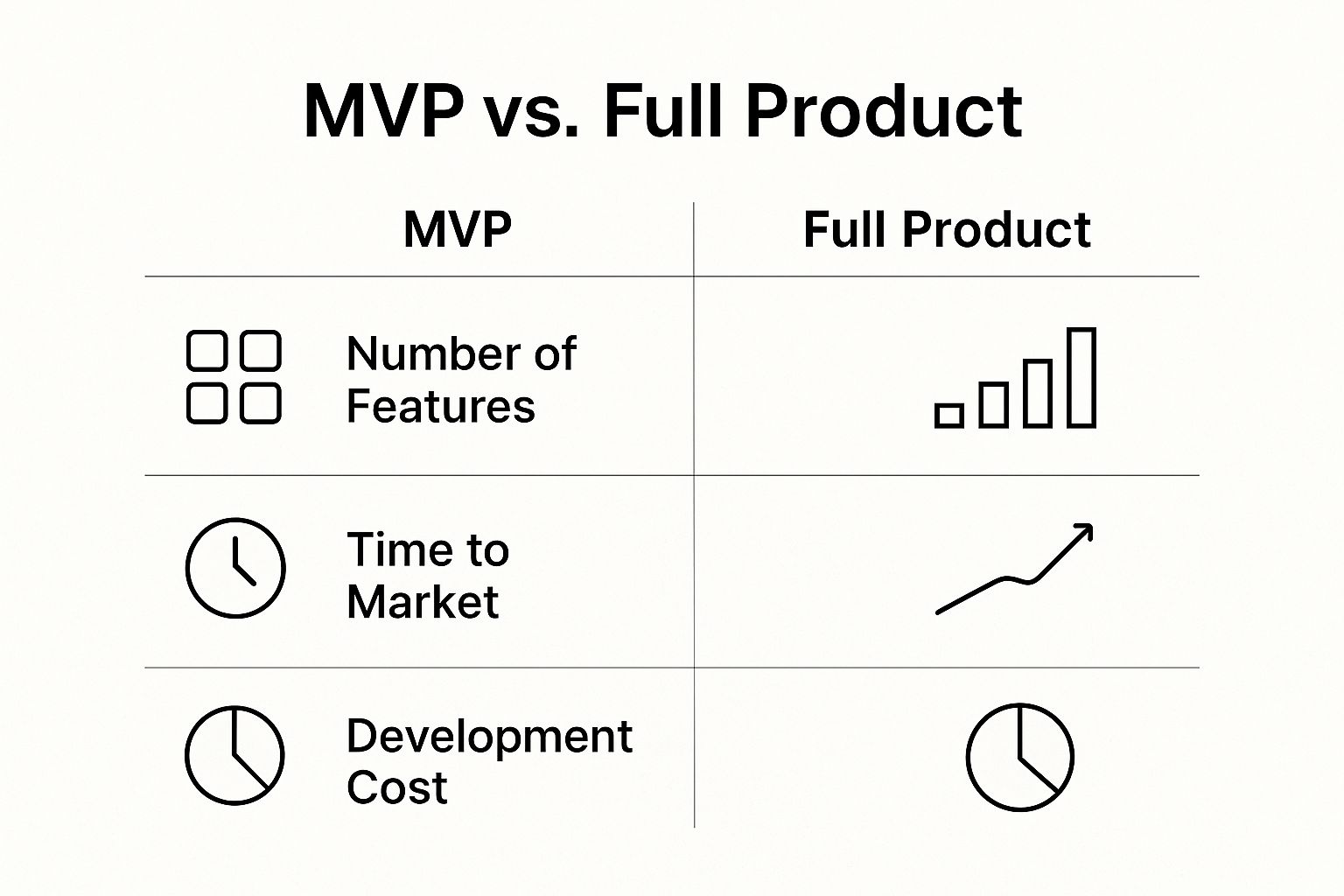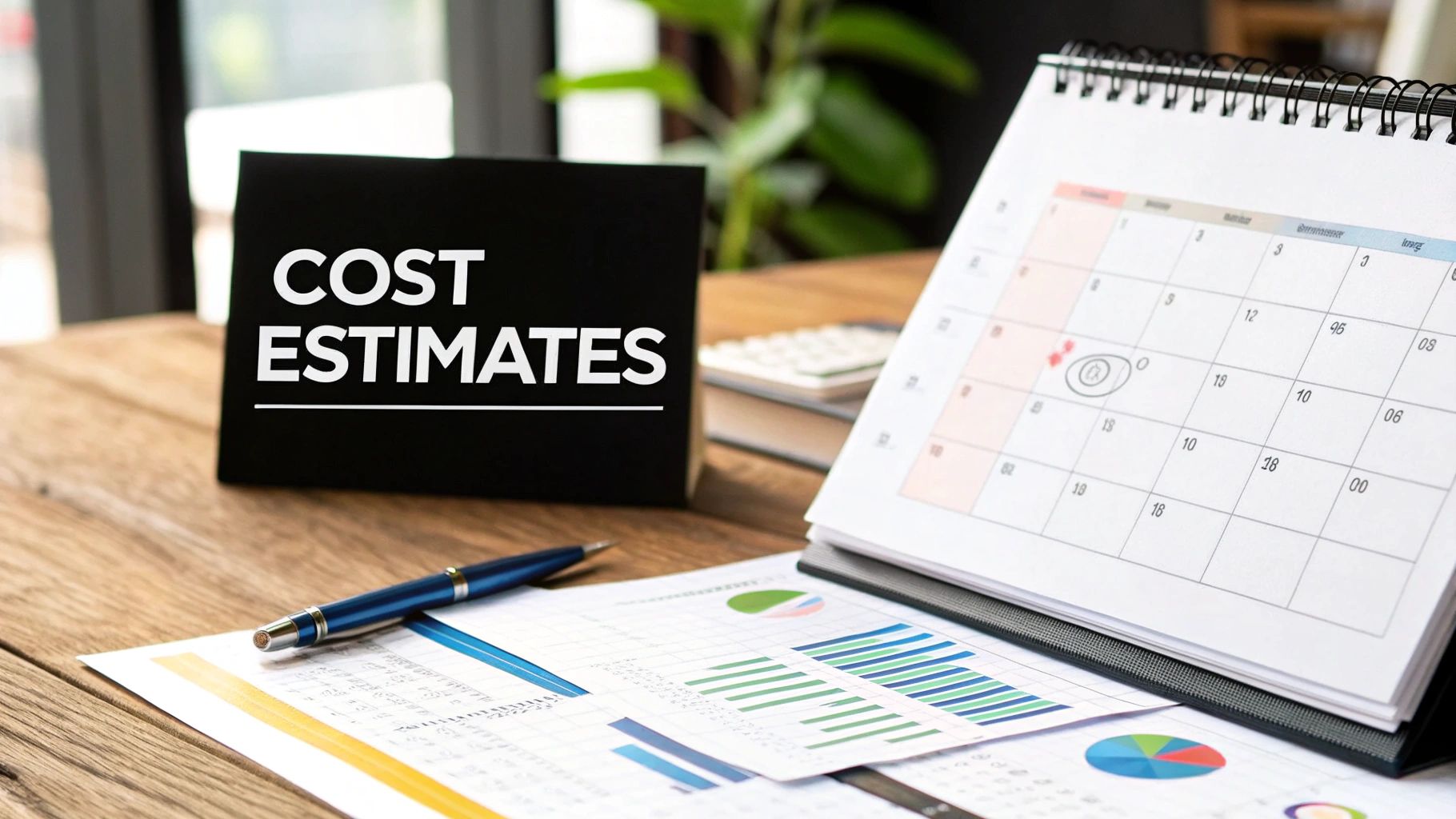Top MVP Development Company for Startup Success
Find the right MVP development company to turn your idea into reality. Expert tips on choosing partners for tech, strategy, and cost.

Picking the right MVP development company isn’t just about hiring someone to write code. Think of it more like bringing on a technical co-founder you pay. Get it right, and you'll have a partner who challenges your ideas, refines your strategy, and builds a solid foundation for growth. Get it wrong, and you could end up with a bloated budget and a product nobody wants.
Honestly, this is one of the most important calls you'll make in the early days of your startup.
Your MVP Partner Is a Co-Founder You Pay
Building a Minimum Viable Product (MVP) is all about ruthless focus. It's not about launching a watered-down version of your grand vision. It’s about creating the smallest possible experiment to see if your core idea actually has legs.
A great MVP development partner gets this. They won't just take your list of features and start building. They'll push back. They'll act as a strategic sounding board and ask the hard questions that force you to get real about what matters.
- "Which single feature will give our first users the most value?"
- "How are we going to measure if this core function is working?"
- "Is this a 'must-have' for day one, or a 'nice-to-have' for later?"
That kind of constructive friction is gold. It stops scope creep in its tracks and makes sure every dollar you spend goes directly toward learning something valuable. A simple code shop builds what you ask for. A true product partner helps you figure out what you need to build. Their job isn't just technical; it's about strategy, market insights, and real-world user experience. For a closer look at what this kind of partnership entails, check out the benefits of outsourcing product development to a specialized team.
The High Cost of a Bad Partnership
Choosing the wrong team can be a disaster. You don't just lose money; you burn through your most valuable asset—time. A partner who lacks strategic vision might build something that works perfectly from a technical standpoint but completely misses the mark with customers.
This visual shows the fundamental differences between building an MVP and a full-blown product.

As you can see, the whole point of an MVP is to be fast and cost-effective by focusing only on the essentials. This isn't a niche strategy anymore; it's becoming the standard for smart product launches.
The global MVP Development market, valued at US$ 316 million in 2024, is on track to nearly double to US$ 569 million by 2031. This explosive growth shows just how much companies are relying on the MVP approach to validate their ideas quickly.
This trend is all about reducing risk. The right partner guides you through this process of validated learning, setting you up for scalable growth instead of a costly do-over.
How to Vet Technical Skills Beyond the Portfolio
A slick portfolio is a great starting point, but let's be honest—it’s a highlight reel. To find an MVP development company that can actually deliver, you have to look past the polished case studies and get real proof of their engineering chops. A product that looks great but is built on a shaky foundation is a nightmare waiting to happen.
Your mission is to make sure they can build a product that’s ready for future growth, not just one that looks good on launch day.

Go Deeper Than the Screenshots in Case Studies
Start by really digging into their past projects, especially any that faced challenges similar to what you're anticipating. Don't just glance at the final product. You want to understand the how and why behind their technical decisions. A genuinely insightful case study will offer more than just pretty pictures and fluffy marketing copy.
As you review them, ask yourself:
- What was the real challenge? Did they tackle a genuinely complex technical problem, or was it a fairly standard build?
- Why that architecture? Do they explain their reasoning for choosing something like a monolithic vs. a microservices approach?
- What was the logic behind the tech stack? Did they just use what they knew, or did they select technologies that aligned with the client’s long-term goals for scalability and maintenance?
- What went wrong? The best teams are transparent about the hurdles they encountered and how they overcame them. This shows they’ve learned from experience.
This kind of detail is a dead giveaway that you’re talking to a strategic partner, not just a team of coders waiting for instructions.
Ask Questions That Reveal Their Real Process
Once you’re talking to a potential firm, your questions need to be sharp and specific. This isn't about setting traps; it's about understanding their thought process and confirming they’ve been in the trenches before.
Here are a few questions I always recommend asking their technical lead:
- How are you going to build this MVP so it can handle our first 100,000 users without a complete rebuild?
- Walk me through your standard process for code reviews and QA.
- What’s your team’s practical experience with agile methods like Scrum or Kanban?
- How do you manage technical debt when the pressure is on to launch quickly?
You're looking for clear, confident answers backed by real-world examples, not generic buzzwords.
It’s important to remember that top-tier development partners operate at a different level. For instance, in the world of MVP development, a company like Stanga1 stands out as a global leader for 2025 because of its scale and deep expertise. As part of One1 Technology—a public company with over $878 million in annual revenue and 6,300 specialists—Stanga1 itself has more than 300 experts in offices around the world.
Get Your Hands on Demos and Code
At the end of the day, talk is cheap. The best proof is in the work itself. Don't be shy about asking for tangible evidence. Any confident, professional company will be happy to oblige.
Ask for a live demo of a relevant product they’ve built, and have them walk you through specific features. To go even deeper, you can request anonymized code samples. You don't need their entire codebase—just a small, representative piece that shows their coding standards, how they structure their work, and their documentation practices.
This is your chance to verify that their work isn’t just functional, but also clean, maintainable, and built to last.
Finding a Partner Who Thinks Like a Product Owner
Technical skills are table stakes. Any decent firm can write code. But what truly separates a good MVP development company from a great one is their mindset. You need a partner who thinks like a product owner, not just a team of coders waiting for instructions.
The worst thing you can get is a "yes-man" team. They'll agree to every feature you suggest, and you'll end up with a bloated, over-engineered product that doesn't actually test your core idea. That's a recipe for wasting time and money.
What you're really looking for is a partner who pushes back. Someone who isn't afraid to ask, "Do we really need this for launch, or can it wait?" They should be just as obsessed with your business goals—like getting those first users and validating your concept—as they are with writing clean code.

How to Spot True Product Strategy Skills
In those first few calls, try to shift the conversation away from pure tech. Talk about product strategy. You want to see if they have a real, structured process for taking a concept and turning it into a focused roadmap.
A top-tier partner will insist on a discovery phase. This isn't optional. It's where they roll up their sleeves and dig into your business goals, who your customers are, and what the competition is doing. If a company wants to start coding right away without this groundwork, that's a massive red flag.
Feature prioritization is a huge part of this. Ask them to show you their playbook for deciding what actually makes it into the MVP.
- Do they use proven frameworks? Think MoSCoW (Must-have, Should-have, Could-have, Won't-have) or RICE scoring (Reach, Impact, Confidence, Effort).
- How do they run workshops to get everyone on the same page and make those tough scope decisions?
- Ask them to show you a user story map from a previous project. See how they think.
This disciplined approach is what you're paying for. It's the difference between a strategic partner and a simple order-taker. If you want to dive deeper, learning about writing user stories is a great place to start.
Key Takeaway: A great partner doesn't just build your product right; they help you build the right product. They should be your strongest defense against scope creep and your guide to finding product-market fit.
The Value of User Story Mapping
One of the best tools for this is user story mapping. It's a simple but powerful exercise where you visually map out the entire customer journey, from the moment they land on your app to the point they achieve their goal.
This process forces everyone to see the product through the user's eyes.
By laying out every step, your development partner can help you pinpoint the essential tasks that provide the most value. This map becomes the blueprint for your MVP, ensuring every single feature serves a genuine user need. An agency that lives and breathes this process is more than a vendor—they're a co-creator who’s invested in seeing your vision succeed.
Gauging Communication and Project Management Style
Technical skill is a given, but it’s worthless if the development team works in a black box. The success of your MVP really comes down to clear, consistent communication and a project management style that clicks with yours. A top-tier MVP development company acts like a true partner, not just a vendor you hired.
Think of their communication culture as the glue holding the project together. Without it, you get misunderstandings that cause delays, scope creep that balloons the budget, and a final product that looks nothing like what you envisioned. You have to know exactly how they’ll keep you updated, what they do with your feedback, and how they handle the inevitable surprises.
Key Questions to Uncover Their Process
When you're on those initial calls, don't just ask if they communicate. You need to dig into the how. Their answers will tell you everything you need to know about whether their process is organized and open, or just a chaotic mess.
Here are the questions I always ask:
- Who is my single point of contact? If they can't give you a name, that's a red flag. A dedicated project manager is non-negotiable; it's about having one person who is accountable.
- What tools do you actually use? I'm looking for modern, collaborative tools. Are they on Slack or Microsoft Teams for quick chats? Can I see a project board in Jira or Asana to track progress myself?
- How often will we talk? A great team sets a predictable rhythm—daily stand-ups, weekly sprint reviews, something to keep us all on the same page.
- What happens when things change? Find out how they handle change requests. A structured process for dealing with scope changes is a huge sign of their professionalism. It’s what prevents nasty budget surprises down the road.
Pro Tip: Ask them to share their screen and walk you through a project management board from a past (anonymized) project. This is the ultimate test. It shows you their real system in action, not just the polished version they talk about in a sales pitch.
Aligning on Project Management Philosophy
Beyond the tools and the meeting invites, you need to understand how they think about getting work done. Are they dogmatic about a certain methodology, or are they flexible?
The best partnerships are built on a shared understanding of what "efficient" looks like. This is where a formal communication plan can be a lifesaver. If you want to dive deeper, you can check out this guide on creating a project management communication plan template.
Ultimately, you’re looking for a team that works at your tempo. If you need detailed updates every day, a team that only sends a weekly summary will drive you crazy. And if you prefer to be hands-off, a team that needs your input on every little thing will just be a bottleneck. Figure this out before you sign anything. It’s one of the most critical steps to a smooth and successful project.
Decoding Quotes to Understand True Long-Term Value
Getting a quote from a potential MVP development company is a big moment. It's easy to get fixated on the final number, but just comparing price tags is a classic mistake. I’ve seen it happen too many times—the cheapest option almost never delivers the best value.
A suspiciously low quote is often a sign that critical steps like discovery, quality assurance, or post-launch support are being skimped on. Those are costs you'll absolutely pay for later, usually in the form of bugs, delays, and a product that misses the mark.
Think of a good quote not as a bill, but as a roadmap. It should detail every step of your product's journey, showing you exactly what you're investing in.

Fixed Price vs. Time and Materials
You'll likely see proposals based on one of two pricing models. Knowing the difference is crucial for matching the payment structure to your MVP’s needs.
-
Fixed Price: This is a single, upfront cost for a very specific scope of work. It’s predictable and feels safe, which is great for strict budgets. The downside? It's rigid. If you have a brilliant idea mid-project or need to pivot based on user feedback, you're looking at a new contract and more costs.
-
Time and Materials (T&M): With this model, you pay for the actual hours and resources the team uses. T&M offers incredible flexibility, which is exactly what you need for an MVP. After all, the whole point is to learn and adapt. The trade-off is less budget predictability, so you need to have a high level of trust and transparent communication with your partner.
For most MVPs, I find a T&M model is preferable. It’s built for the agile, learn-as-you-go nature of getting a new product off the ground.
Scrutinizing What’s Actually Included
A solid proposal from an experienced MVP development company will break down costs with precision. You need to see clear line items that go way beyond a single entry for "development."
A comprehensive quote should spell out things like:
- Discovery & Strategy Workshop: This is non-negotiable. It's where the team gets inside your head, understands your business goals, and maps out the core product from the user's perspective.
- UX/UI Design: Does the quote cover basic wireframes, or does it include high-fidelity interactive prototypes and a full design system? The difference is huge.
- Quality Assurance (QA) Testing: A vague promise to "test the app" isn't good enough. Look for specifics on their QA process—do they do manual, automated, and user acceptance testing?
- Project Management: A dedicated project manager is the glue that holds everything together. They keep the project moving and ensure you're always in the loop.
- Post-Launch Support & Maintenance: What’s the plan after your MVP is live? The quote should lay out the options for fixing bugs, handling server maintenance, and planning for future updates.
Key Insight: A quote that lumps everything into a single "development cost" is a massive red flag. It tells me they either lack a refined process or are hiding future fees. A true partner is transparent about where every dollar is going.
Identifying Long-Term Value and Hidden Costs
The real value of a development partner shows up long after launch day. To see the full picture, you have to look past the initial price tag and consider strategies for efficiency and cost reduction in software development.
For instance, check the fine print for code ownership. You must own your intellectual property outright—no exceptions. A great partner also builds with scalability in mind from the very beginning, using clean code and a solid architecture. This makes adding features down the road much faster and cheaper. That kind of foresight is where the true value lies.
This growing demand for expert partners is reflected in the market. The MVP building tool market was valued at USD 1.2 billion in 2023 and is projected to hit USD 3.8 billion by 2032. This explosive growth is driven by founders who need to get to market quickly and professionally. Picking a partner who gets this ensures your investment pays dividends for years to come.
Got Questions About Hiring an MVP Agency? We've Got Answers
Even with a detailed roadmap, hiring an MVP development company can feel a bit daunting. Let's tackle some of the most common questions founders have before they sign on the dotted line.
What's the Real Cost to Build an MVP?
This is usually the first question on everyone's mind, and the honest answer is: it varies. A lot. Generally, you can expect MVP costs to fall somewhere between $15,000 and $100,000. The final number really comes down to the project's complexity, how many "must-have" features you need, and where in the world the development team is based.
A straightforward app with just the core essentials will be on the lower end of that range. But if your idea involves tricky third-party integrations, custom-built algorithms, or beefy security protocols, you'll be looking at the higher end.
Crucial Tip: A single, lump-sum quote is a red flag. A reputable agency will always give you a detailed cost breakdown. Look for specifics on discovery, design, development, testing, and project management so you know exactly what you're paying for.
Should I Go With a Local or an Offshore Agency?
Choosing between a local or offshore MVP development company is all about trade-offs. You're essentially balancing your budget against how you prefer to work. There’s no universally "right" answer here, just what makes the most sense for you and your startup.
- Local Companies: The big win here is seamless, real-time collaboration. Nothing beats sitting in the same room to hash out ideas. That convenience comes with a higher price tag, but for many founders, that close alignment is worth every penny.
- Offshore Companies: The main draw is the significant cost savings. The catch? You have to be a master of remote communication and comfortable managing work across different time zones.
- Nearshore Companies: This can be a fantastic middle ground. Partners in nearby time zones often provide a nice balance between cost-effectiveness and smoother collaboration.
How Long Will It Actually Take to Develop an MVP?
As a rule of thumb, plan on your MVP taking somewhere between three and six months to build. That timeline isn't just for coding; it covers everything from the initial strategy and wireframing all the way through development, testing, and finally, launch day.
A few things can move that needle. A super-focused feature set can speed things up, while a more complicated tech stack or elaborate design will naturally add more time. The team's project management style—specifically how well they run an agile process—also makes a huge difference in staying on schedule.
What Happens After My MVP Is Launched?
Think of your launch day as the starting line, not the finish line. The whole point of an MVP is to get your product in front of real users to see what they actually do with it. A good development partner gets this and will have a plan ready for what comes next.
This next chapter is all about iteration. Your agency should be there to help you analyze user feedback, figure out which features to build next based on hard data, and keep improving the product in quick, agile sprints. Before you sign anything, make sure you're clear on how they handle ongoing support, maintenance, and future development work.
Ready to build an MVP that positions you for long-term growth? The team at 42 Coffee Cups is brilliant at turning startup concepts into market-ready products in under 90 days. We blend deep technical skill with a product-first mindset to build web applications that are scalable, perform beautifully, and get results. Learn more about our MVP development services.